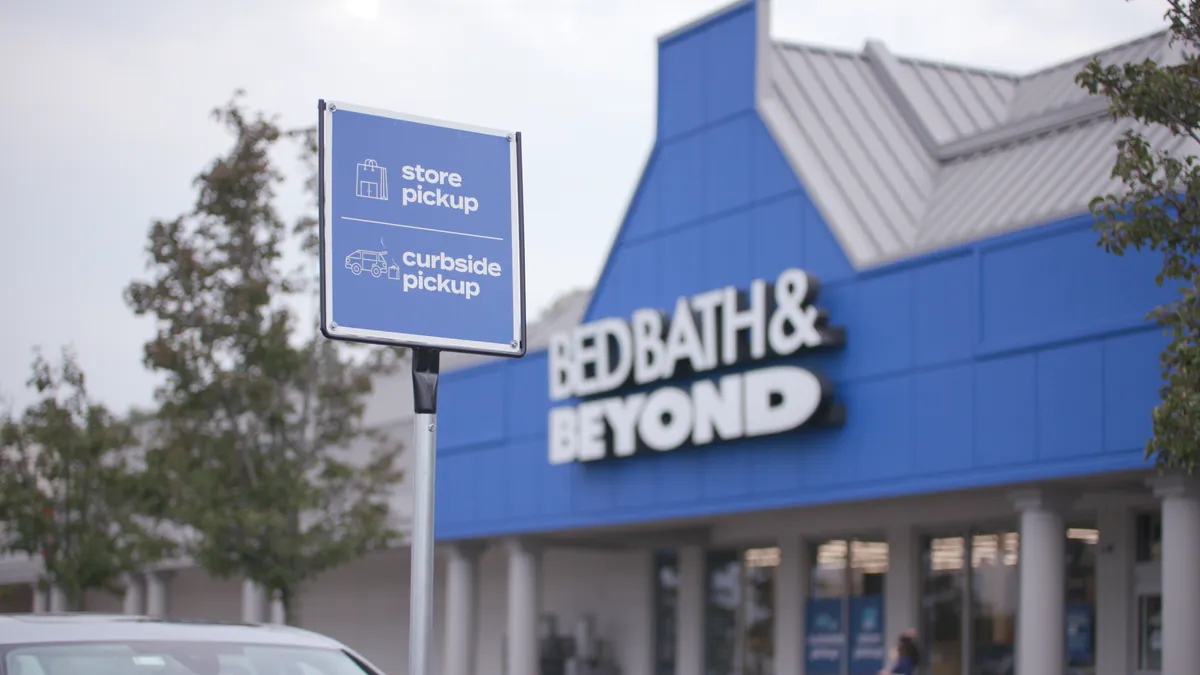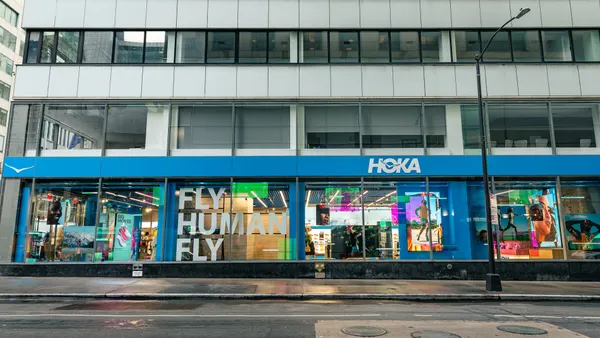Dive Brief:
- In what executives blamed on ongoing supply chain challenges and inventory constraints, Bed Bath & Beyond reported fourth quarter net sales fell 22% year over year to $2.1 billion, while comparable sales fell 12%. The company suffered about $175 million in lost sales during the quarter as a result of out-of-stocks at the Bed Bath & Beyond banner, which continued into March, CEO Mark Tritton said during an analyst call Wednesday.
- Gross margin during the period fell 320 basis points year over year to 28.3%. The home goods retailer swung to a loss of $159 million from a profit of $9 million last year, according to a company press release.
- For the full year, Bed Bath & Beyond reported net sales fell nearly 15% to $7.9 billion, while net loss widened by over 270% to $559.6 million.
Dive Insight:
Executives on Wednesday said they were "disappointed" in Bed Bath & Beyond's financial results as the retailer wrapped up the first year of its multi-year transformation.
"These disastrous results show that Bed Bath & Beyond had a very miserable holiday," GlobalData Managing Director Neil Saunders said in emailed comments. "That they were delivered against a backdrop of strong consumer demand for home products and should have benefited from the various improvements the company has made to stores and products, simply adds insult to injury."
Over the past year, the home goods retailer introduced a number of initiatives aimed at turning around the business. Bed Bath & Beyond has introduced eight private labels since announcing its goal in October 2020 to launch over 10 private labels over the course of 18 months. Retailers have increasingly turned to private labels as a way to improve margins and differentiate their assortment. Target — where Tritton was chief merchant and oversaw the launch of several owned brands — has leaned into this strategy, boasting 48 private labels, 10 of which are billion-dollar brands.
But analysts have criticized whether the labels Bed Bath & Beyond has introduced over the past year are differentiated enough to drive traffic and sales to the retailer. The brands are "bland," Saunders said, adding that "this neutrality neither compels people to buy nor makes Bed Bath & Beyond a destination for homewares."
The retailer has also closed underperforming stores and remodeled others, but in some cases, those stores still appear "messy," according to Saunders, and they lack necessary inventory, which executives have pinned on industrywide supply chain disruption.
"We do not accept the excuse that this is supply chain induced," Saunders said. "While global supply chain issues have been unhelpful, these issues have been occurring for a long time and are deep seated."
Bed Bath & Beyond also introduced an online marketplace at the end of last year and formed a partnership with Kroger to sell products from its namesake and BuyBuy Baby banners on the grocer's website and in select stores. Products became available on Kroger's website last week.
The partnership, according to Saunders, will help alleviate some of the short-term challenges Bed Bath & Beyond is experiencing by potentially attracting a new customer set.
But Bed Bath & Beyond's problems may become more apparent as inflation continues to impact consumer sentiment and demand for home goods comes down from early pandemic highs.
The company continues to face sales and traffic challenges in the first quarter as a result of lack of inventory in stores, according to Chief Financial Officer Gustavo Arnal. Quarter to date, comparable sales are down about 20%, he added. For the full fiscal 2022, Bed Bath & Beyond expects sequential comp sales improvement to occur in the second half of the year, while adjusted gross margin is expected to expand modestly over last year.
Late last month, Bed Bath & Beyond struck a deal with Chewy founder Ryan Cohen and his activist fund, RC Ventures, which together own about 10% of the company's outstanding shares. As a result of the deal, Bed Bath & Beyond has added three directors to its board, which RC Ventures chose. Cohen, which undertook a separate activist campaign at gaming specialist GameStop last year, criticized Bed Bath & Beyond for not focusing more on improving its supply chain, which has led to lost sales. Cohen also suggested separating out BuyBuy Baby from the business and possibly selling the entire company to a financial sponsor.















